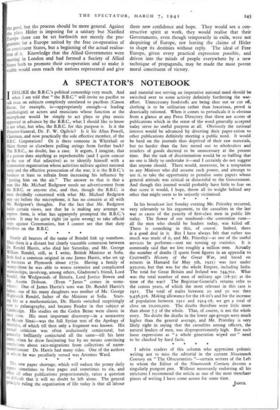In his broadcast last Sunday evening Mr. Priestley recurred, very
relevantly to his argument, to the casualties in the last war as cause of the paucity of first-class men in public life today. The flower of our manhood—the contention runs— all the men who should be leaders today, was killed off. There is something in this, of course. Indeed, there is a good deal in it. But I have always felt that rather too much was made of it, and Mr. Priestley—as one of the useful services he performs—sent me turning up statistics. It is commonly said that we lost roughly a million men. Actually the number of deaths (I quote from figures in an appendix to Cruttwell's History of the Great War, and based on returns in Hansard for May 5th, 1921) was just under 950,000, but that was for the whole Empire, including India. The total for Great Britain and Ireland was 744,702. What was the total number of men of military age (I8-50) at the time of the war? The Registrar-General's returns refer to the census years, of which the most relevant in this case is 1911. The total of males between zo and 50 was then 9,436,316. Making allowance for the 18-20's and for the increase of population between 1911 and 1914-18, we get a total of close on io,000,000. The deaths therefore were little more than about 7.5 of the whole. That, of course, is not the whole story. No doubt the deaths in the lower age-groups were much higher than the general average, and Mr. Priestley is very likely right in saying that the casualties among officers, the natural leaders of men, was disproportionately high. But such loose expressions as "a whole generation wiped out" need to be checked by hard facts.






























 Previous page
Previous page